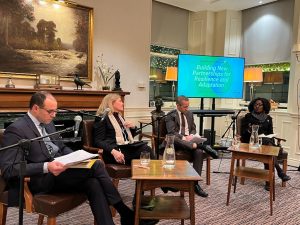AU Disaster Risk Management seeks financial support against climate change
November 16, 2022823 views0 comments
By Cynthia Ezekwe
The African Union Disaster Risk Management (DRM) has called for increased funding to support member states’ efforts on the operationalization of the Africa Multi-Hazard Early Warning and Early Action System (AMHEWAS) aimed at reducing economic losses arising from climate disasters.
Filipe Jacinto Nyusi, president of the multinational risk management organisation, stated this at the ongoing 27th Session of the Conference of the Parties (COP27) to the United Nations Framework Convention on Climate Change (UNFCCC), in Sharm El Sheikh, Egypt.
Nyusi emphasised that Africa’s capacity to build resilience and invest in adaptation was being hampered by inadequate financial capacity, hence the need for support.
Read Also:
Also speaking at the event tagged “Catalysing Investments for the Operationalisation of AMHEWAS”, Petteri Taalas, secretary general of the World Metrology Organization (WMO), called on partners and governments to channel more resources towards Early Warning Systems to enhance early warning not just for disaster risk but also for marine and air transport.
Mami Mizutori, special representative of the UN secretary general for Disaster Risk Reduction, called on partners to support Africa to develop Multi-Hazard Early Warning Systems to bridge the gap between early warning and early action as espoused by the Maputo Ministerial declaration on integrated early warning systems.
David Malpass, World Bank president, in his remarks regretted the scale and magnitude of disasters that were affecting the continent and broad spectrum of society.
To this end, Malpass pledged the bank’s continued support to Africa on adaptation, saying the bank is committed to supporting Africa for climate risk financing.
On his part, Francesco Rocca, president, International Federation of the Red Crescent (IFRC), commended the African Union and its partners on the establishment of the Africa Multi-Hazard Early Warning and Early Action System to save lives and property on the continent.
He stressed the need to ensure that early warning messages are clear, concise and reach the last mile as well as lead to anticipatory action that saves lives

